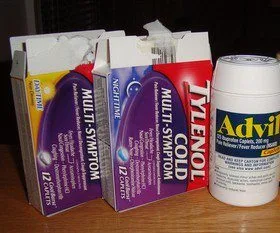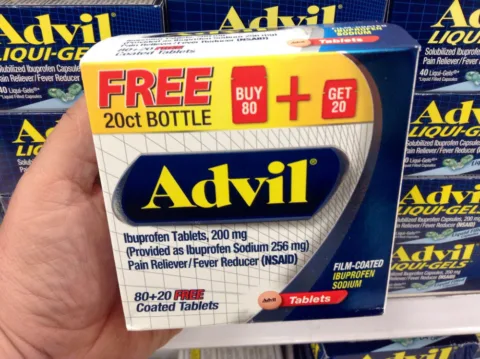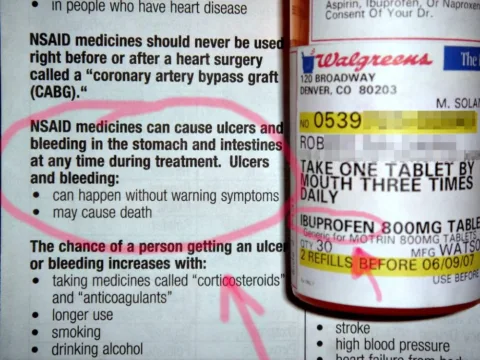With so many pain relievers available these days, it’s hard to know just which one to take — and when.
And is one really any better than another?
Acetaminophen and NSAIDs are 2 of the most popular types of medications that people take for pain relief.
Let’s explore the similarities and differences between the two, as well as some tips if you decide to take either type of pain reliever.
What Is Acetaminophen?
Acetaminophen is an analgesic (pain reliever) and an antipyretic (fever reducer).
Acetaminophen is the generic term for the medication inside Tylenol and a number of other products.
Here’s a list of over-the-counter and prescription medicines that contain Acetaminophen.
Acetaminophen reduces the pain and fever associated with headaches, menstrual cramps, and many other types of pain — but it doesn’t treat inflammation. So, if you have a muscle sprain, or you’re suffering from arthritis or any other condition that has inflammation, Acetaminophen may help with the pain, but it will not reduce the swelling.
Acetaminophen relieves pain by elevating the pain threshold — by requiring a greater amount of pain to develop before it is felt by a person. It reduces fever through its action on the heat-regulating center of the brain. Specifically, it tells the center to lower the body’s temperature when the temperature is elevated. Acetaminophen relieves pain in mild arthritis but has no effect on the underlying inflammation, redness and swelling of the joint. Source
Acetaminophen Warnings
There are so many over the counter pain relievers on the market that contain Acetaminophen — if you aren’t careful, it’s very easy to accidentally overdose on it or damage your liver.
Here’s an example of how easy it is to accidentally overdose:
- You have a headache and you take Extra-Strength Tylenol until you reach the maximum dosage.
- Later you get a scratchy throat and a cough (because you’re starting to come down with a cold), so you take a dose of Robitussin cough syrup that also contains Acetaminophen.
- At that point, you have gone beyond the safe dosage for Acetaminophen.
In reality, taking Acetaminophen is generally safer than taking NSAIDs — as long as you:
- Follow the instructions on the package.
- Pay attention to other products that may have Acetaminophen in them.
- Don’t take more than the recommended daily dosage.
WARNING: When giving Acetaminophen to children — you should never give a child an adult formula of Acetaminophen (either liquid or tablets) because it is very difficult to determine the proper dosage for a child. Instead, you should use the children’s version
that is most appropriate for your child’s weight, and then follow the instructions on the package to a tee.
What Are NSAIDs?
NSAIDs (non-steroidal anti-inflammatory drugs) have anti-inflammatory (swelling reducer), analgesic (pain reliever), and antipyretic (fever reducer) effects.
So, in addition to relieving pain, NSAIDs also reduce inflammation — which is important if you’re suffering from rheumatoid arthritis (which causes inflammation) or if you have a muscle strain (such as can be sustained while playing sports).
Some of the most popular NSAIDs are:
- Aspirin (including Anacin, Ascriptin, Bayer, Bufferin, Ecotrin, Excedrin)
- Ibuprofen
- Advil
- Aleve
- Naproxen
- Motrin
Here’s a complete list of NSAIDs.
Here are the symptoms that NSAIDs help the most with — when NSAIDs are the most beneficial:
- Pain, stiffness, and swelling from arthritis are present.
- You have pain resulting from a procedure.
- You’re in pain caused by straining a muscle.
- There’s inflammation in a tendon (tendonitis) or bursa (bursitis)
NSAIDs work by preventing an enzyme (a protein that triggers changes in the body) from doing its job. The enzyme is called cyclooxygenase, or COX, and it has two forms. COX-1 protects the stomach lining from harsh acids and digestive chemicals. It also helps maintain kidney function. COX-2 is produced when joints are injured or inflamed. Traditional NSAIDs block the actions of both COX-1 and COX-2, which is why they can cause stomach upset and bleeding as well as ease pain and inflammation. Source
NSAID Warnings
One of the problems with NSAIDs (and the reason that many people choose to use Acetaminophen instead) is the fact that NSAIDs can only be be used for short periods of time due to the side effects, including stomach bleeding.
For those with ulcers, Acid Reflux Disease, and other gastrointestinal problems, NSAIDs are not a good choice for over the counter pain relief — because they can exacerbate these health issues. In some cases, NSAIDs can even cause ulcers.
There seems to be a plateau for effectiveness, with recommended doses close to those required for maximal effectiveness. However, the risk of adverse effects increases with increasing dose, with no plateau. Oral NSAIDs that selectively inhibit COX-2 have a reduced risk of causing gastrointestinal ulcers compared with less-selective NSAIDs. However, COX-2 inhibitors increase the risk of myocardial infarction and other cardiovascular events. Source
So, if you’re going to use NSAIDs, use them carefully and follow the directions to a tee.
WARNING: Do not give children an over-the-counter NSAID for longer than 10 days. See this list of NSAIDs available for children, plus tips for giving the correct dosage of Ibuprofen to children.
https://youtube.com/watch?v=MJ9pamb9lhc%3Ffs%3D1%26hl%3Den_US%26rel%3D0
So Which One Should You Take?
 I know I’ve given you a lot of info, so here’s the deal:
I know I’ve given you a lot of info, so here’s the deal:
- If you need to take a pain reliever fairly regularly, Acetaminophen is generally safer than NSAIDs.
- If you have moderate to severe pain (with swelling) for only a short period of time, use an NSAID pain reliever.
More About Acetaminophen And NSAIDs
In addition to the links I’ve included above, here are a few more resources to help you understand when to take over the counter pain relievers:










